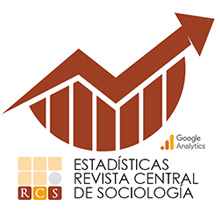"Not staying with the wheelchair on me": the social experience of becoming disabled in Chile
Keywords:
Disability, normality, cyborg, interdependencies, human rightsAbstract
The purpose of this article is to analyze how disability is socially constructed through the life experience of a woman who became disabled by a car accident at the age of 24. The theoretical lens that accompanies this work is that of critical and social studies of disability. The study had a qualitative approach and a narrative design. For the presentation of the results, three key moments in Sole's life were considered: the moment of the accident as a space of rupture with "normality"; the constitution as a person with a disability; and the social challenges it faces in Chile. The work concludes that becoming disabled implies creating alternative meanings and a transformed identity that places interdependencies at the center in a possible posthuman assemblage within a capacitive context.
Downloads
Metrics
References
Abbott, D., Carpenter, J., Gibson, B. E., Hastie, J., Jepson, M., & Smith, B. (2019). Disabled men with muscular dystrophy negotiate gender. Disability & Society, 34(5), 683-703. https://doi.org/10.1080/09687599.2019.1584093
Aho, A. C., Hultsjö, S., & Hjelm, K. (2019). Perceptions of the transition from receiving the diagnosis recessive limb-girdle muscular dystrophy to becoming in need of human support and using a wheelchair: An interview study. Disability and Rehabilitation, 41(19), 2289-2298. https://doi.org/10.1080/09638288.2018.1464602
Albrecht, G. L., Seelman, K. D., & Bury, M. (2001). Handbook of disability studies. Sage Publications.
Andreasson, I., Kjellby-Wendt, G., Fagevik-Olsén, M., Karlsson, J., & Carlsson, G. (2020). Life has become troublesome – my wrist bothers me around the clock: An interview study relating to daily life with a malunited distal radius fracture. Disability and Rehabilitation, 42(16), 2344-2350. https://doi.org/10.1080/09638288.2018.1561954
Barnes, C. (1999). Disability Studies: New or not so new directions? Disability & Society, 14(4), 577-580.
Bröckling, U. (2015). El self emprendedor (Ediciones Universidad Alberto Hurtado, Vol. 173). Santiago de Chile.
Campbell, F. K. (2009). Disability Matters: Embodiment, Teaching and Standpoint. En F. K. Campbell (Ed.), Contours of Ableism: The Production of Disability and Abledness (pp. 115-129). London: Palgrave Macmillan UK. https://doi.org/10.1057/9780230245181_7
Emerson, E., Kariuki, M., Honey, A., & Llewellyn, G. (2014). Becoming disabled: The association between disability onset in younger adults and subsequent changes in productive engagement, social support, financial hardship and subjective wellbeing. Disability and Health Journal, 7(4), 448-456. https://doi.org/10.1016/j.dhjo.2014.03.004
Ferrante, C. (2009). Las nuevas aportaciones del modelo social de la discapacidad: Una reflexión sociológica crítica. Intersticios. Revista sociológica de pensamiento crítico, 3(1).
Flick, U. (2007). Introducción a la investigación cualitativa. Fundación Paideia Galiza. Ediciones Morata.
Fundación con Trabajo. (2021). Informe de evolución de la ley n° 21.015 que incentiva la inclusión de personas con discapacidad al mundo laboral período febrero 2019 a febrero 2021. Santiago.
Goodley, D. (2014a). Dis/ability studies: Theorising disablism and ableism (1st Edition). New York: Routledge, Taylor & Francis Group.
Goodley, D. (2014b). The posthuman. Disability & Society, 29(5), 844-846. https://doi.org/10.1080/09687599.2014.889416
Goodley, D., Lawthom, R., & Runswick Cole, K. (2014). Posthuman disability studies. Subjectivity, 7(4), 342-361. https://doi.org/10.1057/sub.2014.15
Hutchinson, K., Roberts, C., & Daly, M. (2018). Identity, impairment and disablement: Exploring the social processes impacting identity change in adults living with acquired neurological impairments. Disability & Society, 33(2), 175-196. https://doi.org/10.1080/09687599.2017.1392931
Kittay, E. F. (2019). Learning from My Daughter: The Value and Care of Disabled Minds. Oxford University Press.
Kvale, S., Blanco, C., & Amo, T. (2011). Las entrevistas en investigación cualitativa. Ediciones Morata.
Mariño, M. V. (2009). Teoría y práctica: un viaje de ida y vuelta. Atlas.ti y el proceso de investigación cualitativa. 29
Meekosha, H., & Shuttleworth, R. (2009). What’s so ‘critical’ about critical disability studies? Australian Journal of Human Rights, 15(1), 47-75. https://doi.org/10.1080/1323238X.2009.11910861
Monforte, J., Smith, B., & Pérez-Samaniego, V. (2021). ‘It’s not a part of me, but it is what it is’: The struggle of becoming en-wheeled after spinal cord injury. Disability and Rehabilitation, 43(17), 2447-2453. https://doi.org/10.1080/09638288.2019.1702725
Oliver, M. (1990). The politics of disablement. Basingstoke: Palgrave Macmillan.
ONU. (2006). Convención sobre los derechos de las personas con discapacidad. Recuperado de https://www.un.org/esa/socdev/enable/documents/tccconvs.pdf
Palacios, A. (2017). El modelo social de discapacidad y su concepción como cuestión de derechos humanos. Revista Colombiana de Ciencias Sociales, 8(1), 14. https://doi.org/10.21501/22161201.2190
Revuelta, B. (2019). La complejidad de abordar los cuidados y la discapacidad. Algunos guiños reflexivos para el caso chileno. En A. Yarza de los Ríos, L. Mercedes, & B. Pérez (Eds.), Estudios críticos en discapacidad: Una polifonía desde América Latina. Consejo Latinoamericano de Ciencias Sociales.
Revuelta, B. (2021). Las experiencias relacionales de los cuidados: Madres e hijos/as con discapacidad severa en Chile (Tesis de doctorado). Universidad Alberto Hurtado, Santiago.
Revuelta, B., & Hernández, R. (2021). Estudios críticos en discapacidad: Aportes epistemológicos de un campo plural. Cinta de Moebio. Revista de Epistemología de Ciencias Sociales, (70), 17-33. http://dx.doi.org/10.4067/s0717-554x2021000100017
Ruiz Schmidt, A. S. (2008). El proceso de ajuste personal, familiar y laboral de cuatro personas adultas, con discapacidad física adquirida por un accidente. http://18.188.26.221:8082/repositorio/handle/123456789/666
Shakespeare, T. (2006). Disability Rights and Wrongs (1 edition). New York: Routledge.
Smith, L., Wedgwood, N., Llewellyn, G., & Shuttleworth, R. (2015). Sport in the Lives of Young People with Intellectual Disabilities: Negotiating Disability, Identity and Belonging. Journal of Sport for Development.
Sparkes, A. C., Brighton, J., & Inckle, K. (2018). ‘It’s a part of me’: An ethnographic exploration of becoming a disabled sporting cyborg following spinal cord injury. Qualitative Research in Sport, Exercise and Health, 10(2), 151-166. https://doi.org/10.1080/2159676X.2017.1389768
Thomas, C. (2004). Rescuing a social relational understanding of disability. Scandinavian Journal of Disability Research, 6(1), 22-36. https://doi.org/10.1080/15017410409512637
Tronto, J. C. (2015). Who cares? How to reshape a democratic politics. Ithaca: Cornell Selects, an imprint of Cornell University Press.
Venturiello, M. P., & Ferrante, C. (2018). Discapacidad y salud desde dos investigaciones cualitativas: Los itinerarios de la rehabilitación en Argentina y Chile. Apuntes, 45(83), 91-121. https://doi.org/10.21678/apuntes.83.918
Zerega, M. M., Román, C. T., & Bujanda, H. (2020). Devenir discapacitado: Nuevos monstruos, cyborgs y desplazados en el capitalismo contemporáneo. Nómadas, (52), 149-165. https://doi.org/10.30578/nomadas.n52a9

















